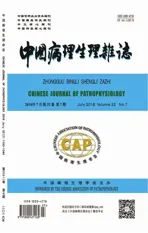神经元去极化反跳现象的研究进展*
2016-08-24李凌超朱梦叶张达颖
李凌超, 朱梦叶, 张达颖△, 柳 涛
(南昌大学第一附属医院1疼痛科,2儿科,江西南昌330006)
·综 述·
神经元去极化反跳现象的研究进展*
李凌超1, 朱梦叶1, 张达颖1△, 柳 涛2△
(南昌大学第一附属医院1疼痛科,2儿科,江西南昌330006)
去极化反跳;超极化;神经元;动作电位
神经元受刺激后产生动作电位,并将该刺激信号传递给其它的神经元,进而影响整个神经回路。这种接受去极化刺激后能够产生动作电位的特性,是判断细胞是否具有兴奋性的标准。然而亦有研究表明,神经元在接受超极化刺激后也能爆发动作电位,被称为“去极化反跳 (rebound depolarization)”[1-2]。通常超极化使膜电位增大,产生抑制效应,使神经元兴奋性降低,而去极化反跳是由超极化引起的去极化反应,有的还能产生动作电位,使神经元兴奋性增高。本文结合国、内外近年来对神经元去极化反跳的基本特性及其机制以及在生理和病理状态下作用的研究进展加以综述。
1 去极化反跳的基本特性及产生和调控机制
当正离子由膜内向膜外转运(如腺苷A1受体激活后引起的钾离子外流[3])或负离子由膜外向膜内转运(如甘氨酸和γ-氨基丁酸受体激活后引起的氯离子内流[4])时,可引起膜内正电荷流出膜外,这种外向电流可使膜电位增大,发生超极化。去极化反跳被定义为神经元细胞膜在接受超极化刺激后出现的短暂去极化现象,部分神经元在该去极化的基础上可爆发动作电位[5-6]。
去极化反跳现象已在许多不同区域的神经元上记录到,例如中枢神经系统的脑区,包括新皮质中间神经元[7]、大脑皮质锥体神经元[8]、基底神经节腹侧苍白球神经元[9]、嗅球上的神经元[10]、上橄榄旁核神经元[11]、丘脑[12-13]、下丘脑[14]、海马[15]、脑干起搏器神经元[16]和小脑[12]等;中枢神经系统的脊髓区包括脊髓前角运动神经元[17]、脊髓背角感觉神经元[2,18]。周围神经系统的神经核团及神经节:三叉神经中脑核[19]、位听神经的耳蜗螺旋神经节细胞[20]及前庭神经节细胞[21]。
虽然去极化反跳在不同区域神经元上报道过,但这些报道依据不同的标准,对去极化反跳的分类也不尽相同,具体如下:在大直径的深部小脑核神经元细胞上,根据去极化反跳的放电频率和模式,将其分为transient burst和weak burst,前者的放电频率为(58.6±7.83)Hz,后者为(11.7±1.17)Hz[22]。
在脊髓背角神经元上,根据去极化反跳频率改变的时程分为 T-反跳(transient high-frequency rebound)和S-反跳(slow rebound)两类。T-反跳的特点是放电频率短暂地升高后迅速地下降,而S-反跳放电频率则缓慢地衰减;根据去极化反跳的阈下振幅大小分为低振幅反跳[(4.0±0.4)mV]及高振幅反跳[(19.3±1.3)mV][18]。
我们实验室在前期研究(尚未发表)中也发现,约40%的脊髓背角Ⅱ层胶状质区(substantia gelatinosa,SG)神经元具有去极化反跳,根据去极化反跳的振幅和放电频率等参数,我们将SG神经元的去极化反跳分为两大类:阈下去极化反跳与反跳放电,后者又可分为transient burst和weak burst(图1)。

Figure 1.Classification of rebound depolarization(RD)in SG neurons.图1 SG神经元去极化反跳分类
去极化反跳的产生是由于超极化刺激引起低阈值T型钙通道开放后,钙离子内流导致去极化,达到动作电位产生阈值后,爆发放电[23]。超极化激活的阳离子电流(Ih)和T型钙电流(IT)是影响去极化反跳的重要离子机制[24-25]。实验表明,在没有钙离子的人工脑脊液灌流下,超极化刺激不能诱发出反跳电流,说明去极化反跳需要钙离子的参与[18]。TTAP2(特异性T型钙通道阻断剂)能阻断突触抑制和注入电流诱发的去极化反跳[22];mibefradil及其衍生物NNC 55-0396(选择性T型钙通道阻断剂)能部分阻断反跳电流;高浓度的NiCl2(T型钙通道阻断剂)能完全阻断去极化反跳[18]。以上研究证实:Ih和IT是去极化反跳产生的基础。除了Ih和IT,可能还有其它电流参与去极化反跳,例如电压门控钠电流、延迟整流钾电流和漏电流[25]。
研究表明在小脑核神经元上,去极化反跳的大小和超极化刺激的强度、持续时间成正比[26]。Ih和IT在调节去极化反跳的频率、时程和精度中起着不同的作用[25]。Ih决定反跳的振幅、潜伏期和精度。Ih和低振幅反跳相关,不容易引发放电。Ih越大,反跳放电潜伏期越短,因此加速反跳的起始,促进IT介导的反跳,增强IT产生反跳放电的能力。另外,Ih通过降低膜时间常数增加第1个反跳放电的精度[18]。
电压依赖性钙通道分为L型、N型、P/Q型、R型和T型,其中,T型钙通道调控反跳的振幅和放电频率,与高振幅和高频的去极化反跳放电相关。因为高振幅反跳神经元的放电阈值更低,更容易去极化,兴奋性更高,所以高振幅反跳通常引起高频放电。IT能很大程度上增加反跳的振幅和放电,是决定反跳放电分型及阈下反跳振幅的关键因素[18]。其它因素包括Ih和IT在早期时相调节反跳反应,小脑核神经元的非失活L型钙电流通过激活谷氨酸受体能增加晚期时相的反跳频率[27]。还有研究表明去极化反跳受持续性钠电流调节[28]。
2 去极化反跳在生理状态下的作用
去极化反跳现象在神经元的生理状态下广泛存在[29]。在离体实验中,证实了脊髓神经元存在去极化反跳现象[30],后来有文献记载在体实验中,脊髓神经元同样存在该现象[31]。
去极化反跳对许多脊髓背角神经元来说是固有的特性,能参与整合脊髓躯体感觉信息。反跳现象有助于神经元形成编码的特性,通过调节放电的时间和频率决定对躯体感觉的处理。Rivera-Arconada等[18]认为具有去极化反跳的神经元可能参与外周刺激强度的识别以及抑制-兴奋信息间的转换。
实验研究表明,蝙蝠延迟调音的信号在下丘脑产生,和反跳反应同时发生,在一个声音信号末尾反跳兴奋的重叠导致时程调谐。去极化反跳在听觉和视觉信息的传递过程中发挥着重要作用,使神经元更容易突发放电,并且能够精确地传播感觉信号[11,20,32-33]。
有关三叉神经的研究发现,三叉神经低频共振的发生来源于神经元超极化引起的反跳反应,而且证实了三叉神经的低频共振由Ih产生,并且该Ih可被ZD7288阻断[19]。
前庭神经元放电的特性与Ih相关。有动物实验表明大鼠前庭神经节细胞中有9%的细胞记录到反跳放电,而且Ih电流密度增加能使激活时间常数降低,是发育期前庭神经元放电性质改变的基础[21]。
3 去极化反跳在病理状态下的研究发现
锥体神经元的去极化反跳引起的过度兴奋是癫痫发生的机制之一[8]。癫痫失神发作以在丘脑-皮质回路中释放的3赫兹棘慢波(spike-and-wave discharge,SWD)为特征,丘脑网状核神经元的突发放电被认为能产生和维持丘脑皮层的振荡,导致SWD。T型钙通道的激活可引发丘脑网状核神经元固有的和节律性的突发放电,然而,实验证明,把小鼠T型钙通道敲除,使突发放电完全消失,却发现在丘脑网状核神经元上增加的Tonic放电似乎足以产生药物诱导的SWD,这可以质疑丘脑网状核神经元突发放电在SWD产生中的作用,说明反跳性突发放电不是失神发作所必需的,需要重新思考癫痫失神发作的机制[34]。
在帕金森疾病的研究中发现,当丘脑神经元放电活跃的时候,黑质传入的抑制性电位不足以产生反跳放电,然而,随着突发的或一系列快速的反跳放电则可诱发低水平的兴奋,这可能是帕金森产生和传递的病理学基础。在帕金森小鼠模型中观察到,同步的突发放电可诱发低阈值反跳放电(low-threshold spike,LTS)。事实上在帕金森病人中观察到高度的LTS放电,因此清醒状态下丘脑神经元过多的LTS放电可能是帕金森患者运动功能失调尤其是震颤的产生原因[35]。
缺氧可以引起大鼠小脑浦肯野细胞短暂的超极化,然后出现短暂的去极化和持续超极化。由于缺氧时能量代谢障碍导致三磷酸腺苷水平降低,激活三磷酸腺苷敏感的钾离子通道引起钾离子外流,以及谷氨酸(兴奋性氨基酸)能突触传递的迅速抑制,腺苷释放增多而激活腺苷A1受体引起缺氧性超极化。缺氧性去极化被认为是神经元缺氧性损伤的触发机制,芍药苷能对抗缺氧引起的兴奋性氨基酸过度释放,阻断钠离子通道,抑制浦肯野细胞缺氧性去极化的幅度和时程,并延长浦肯野细胞膜电位缺氧性反应的潜伏期,表明芍药苷能增强浦肯野细胞的缺氧耐受性,有利于维持小脑环路的稳定输出,从而具有神经保护意义[3]。
Ih和/或IT介导的去极化反跳可调控SG神经元兴奋性,参与疼痛局部神经回路的调制,进而影响痛觉信息的传递,抑制去极化反跳的发生可能是脊髓镇痛机理之一。已有研究表明,去极化反跳与 Ih和IT相关,而Ih及IT的活化与疼痛密切相关[25]。SD大鼠坐骨神经结扎导致Ih表达增加,而且在疼痛期间神经兴奋性增高,应用介导Ih的超极化激活的环核苷酸门控通道(hyperpolarization-activated cyclic nucleotide gated channels,HCN)特异性阻断剂ZD7288后Ih表达减少,疼痛缓解[36]。在初级传入神经元中,IT主要通过Cav3.2亚型与躯体和内脏伤害性过程广泛相关[37]。在不同疼痛模型中的T型钙通道表达比例显著上升,IT阻断后,在外周[38-39]和脊髓[40]水平都可有效缓解触诱发痛及机械痛敏。
4 现状和展望
目前对去极化反跳基本特性的研究已取得了一定的成果,该现象作为神经元细胞膜的固有特性,在调控细胞兴奋性、突触可塑性及局部回路功能中起到的关键作用已被证实,但是去极化反跳的分类与神经元上Ih、IT及其相应通道亚型表达的关系仍不清楚。其具体作用及机制仍需神经电生理与免疫组化、Western blot以及RT-PCR技术相结合的基础实验研究。深入研究神经元去极化反跳,将为治疗疾病的药物研发带来新的契机。
[1] De Zeeuw CI,Chorev E,Devor A,et al.Deformation of network connectivity in the inferior olive of connexin 36-deficient mice is compensated by morphological and electrophysiological changes at the single neuron level[J].J Neurosci,2003,23(11):4700-4711.
[2] 王佳楠,王文挺,段建红,等.大鼠脊髓背角胶质层神经元的“超极化反跳”现象[J].第四军医大学学报,2007,28(11):1011-1013.
[3] 任颖鸽,谭晓丽,陈 静,等.芍药苷抑制大鼠小脑浦肯野细胞对急性缺氧的功能反应[J].中国病理生理杂志,2015,31(4):664-668.
[4] Bright DP,Smart TG.Methods for recording and measuring tonic GABAAreceptor-mediated inhibition[J].Front Neural Circuits,2013,7:193.
[5] Surges R,Sarvari M,Steffens M,et al.Characterization of rebound depolarization in hippocampal neurons[J].Biochem Biophys Res Commun,2006,348(4):1343-1349.
[6] Chen K,Aradi I,Thon N,et al.Persistently modified hchannels after complex febrile seizures convert the seizureinduced enhancement of inhibition to hyperexcitability[J].Nat Med,2001,7(3):331-337.
[7] Deuchars J,Thomson AM.Innervation of burst firing spiny interneurons by pyramidal cells in deep layers of rat somatomotor cortex:paired intracellular recordings with biocytin filling[J].Neuroscience,1995,69(3):739-755.
[8] Wu Y,Liu D,Song Z.Neuronal networks and energy bursts in epilepsy[J].Neuroscience,2015,287:175-186.
[9] Lavin A,Grace AA.Physiological properties of rat ventral pallidal neurons recorded intracellularly in vivo[J].J Neurophysiol,1996,75(4):1432-1443.
[10]Balu R,Strowbridge BW.Opposing inward and outward conductances regulate rebound discharges in olfactory mitral cells[J].J Neurophysiol,2007,97(3):1959-1968.
[11]Kopp-Scheinpflug C,Tozer AJ,Robinson SW,et al.The sound of silence:ionic mechanisms encoding sound termination[J].Neuron,2011,71(5):911-925.
[12]McCormick DA,Pape HC.Properties of a hyperpolarization-activated cation current and its role in rhythmic oscillation in thalamic relay neurones[J].J Physiol,1990,431:291-318.
[13] McCormick DA,McGinley MJ,Salkoff DB.Brain state dependent activity in the cortex and thalamus[J].Curr Opin Neurobiol,2015,31:133-140.
[14]Armstrong WE,Stern JE.Phenotypic and state-dependent expression of the electrical and morphological properties of oxytocin and vasopressin neurones[J].Prog Brain Res,1998,119:101-113.
[15]Ascoli GA,Gasparini S,Medinilla V,et al.Local control of postinhibitory rebound spiking in CA1 pyramidal neuron dendrites[J].J Neurosci,2010,30(18):6434-6442.
[16]Del Negro CA,Morgado-Valle C,Hayes JA,et al.Sodium and calcium current-mediated pacemaker neurons and respiratory rhythm generation[J].J Neurosci,2005,25 (2):446-453.
[17]Aizenman CD,Linden DJ.Regulation of the rebound depolarization and spontaneous firing patterns of deep nuclear neurons in slices of rat cerebellum[J].J Neurophysiol,1999,82(4):1697-1709.
[18]Rivera-Arconada I,Lopez-Garcia JA.Characterisation of rebound depolarisation in mice deep dorsal horn neurons in vitro[J].Pflugers Arch,2015,467(9):1985-1996.
[19]Yang J,Hu S,Li F,et al.Resonance characteristic and its ionic basis of rat mesencephalic trigeminal neurons[J].Brain Res,2015,1596:1-12.
[20]Ramekers D,Versnel H,Strahl SB,et al.Recovery characteristics of the electrically stimulated auditory nerve in deafened guinea pigs:relation to neuronal status[J].Hear Res,2015,321:12-24.
[21]Yoshimoto R,Iwasaki S,Takago H,et al.Developmental increase in hyperpolarization-activated current regulates intrinsic firing properties in rat vestibular ganglion cells[J].Neuroscience,2015,284:632-642.
[22]Tadayonnejad R,Anderson D,Molineux ML,et al.Rebound discharge in deep cerebellar nuclear neurons in vitro [J].Cerebellum,2010,9(3):352-374.
[23]Boehme R,Uebele VN,Renger JJ,et al.Rebound excitation triggered by synaptic inhibition in cerebellar nuclear neurons is suppressed by selective T-type calcium channel block[J].J Neurophysiol,2011,106(5):2653-2661.
[24]Herrmann S,Schnorr S,Ludwig A.HCN channels:modulators of cardiac and neuronal excitability[J].Int J Mol Sci,2015,16(1):1429-1447.
[25]Engbers JD,Anderson D,Tadayonnejad R,et al.Distinct roles for ITand IHin controlling the frequency and timing of rebound spike responses[J].J Physiol,2011,589(Pt 22):5391-5413.
[26]Bengtsson F,Ekerot CF,Jorntell H.In vivo analysis of inhibitory synaptic inputs and rebounds in deep cerebellar nuclear neurons[J].PLoS One,2011,6(4):e18822.
[27] Zheng N,Raman IM.Prolonged postinhibitory rebound firing in the cerebellar nuclei mediated by group I metabotropic glutamate receptor potentiation of L-type calcium currents[J].J Neurosci,2011,31(28):10283-10292.
[28]Sangrey T,Jaeger D.Analysis of distinct short and prolonged components in rebound spiking of deep cerebellar nucleus neurons[J].Eur J Neurosci,2010,32(10): 1646-1657.
[29]Kawaguchi SY,Sakaba T.Control of inhibitory synaptic outputs by low excitability of axon terminals revealed by direct recording[J].Neuron,2015,85(6):1273-1288.
[30] Yoshimura M,Jessell TM.Membrane properties of rat substantia gelatinosa neurons in vitro[J].J Neurophysiol,1989,62(1):109-118.
[31]Graham BA,Brichta AM,Callister RJ.In vivo responses of mouse superficial dorsal horn neurones to both current injection and peripheral cutaneous stimulation[J].J Physiol,2004,561(Pt 3):749-763.
[32]Suga N.Neural processing of auditory signals in the time domain:delay-tuned coincidence detectors in the mustached bat[J].Hear Res,2015,324:19-36.
[33]Butts DA,Weng C,Jin J,et al.Temporal precision in the neural code and the timescales of natural vision[J].Nature,2007,449(7158):92-95.
[34]Lee SE,Lee J,Latchoumane C,et al.Rebound burst firing in the reticular thalamus is not essential for pharmacological absence seizures in mice[J].Proc Natl Acad Sci US A,2014,111(32):11828-11833.
[35]Edgerton JR,Jaeger D.Optogenetic activation of nigral inhibitory inputs to motor thalamus in the mouse reveals classic inhibition with little potential for rebound activation [J].Front Cell Neurosci,2014,8:36.
[36]Du L,Wang SJ,Cui J,et al.The role of HCN channels within the periaqueductal gray in neuropathic pain[J].Brain Res,2013,1500:36-44.
[37] Jacus MO,Uebele VN,Renger JJ,et al.Presynaptic Cav3.2 channels regulate excitatory neurotransmission in nociceptive dorsal horn neurons[J].J Neurosci,2012,32 (27):9374-9382.
[38]Sekiguchi F,Kawabata A.T-type calcium channels:functional regulation and implication in pain signaling[J].J Pharmacol Sci,2013,122(4):244-250.
[39]Yue J,Liu L,Liu Z,et al.Upregulation of T-type Ca2+channels in primary sensory neurons in spinal nerve injury [J].Spine(Phila Pa 1976),2013,38(6):463-470.
[40]Matthews EA,Dickenson AH.Effects of ethosuximide,a T-type Ca2+channel blocker,on dorsal horn neuronal responses in rats[J].Eur J Pharmacol,2001,415(2-3): 141-149.
(责任编辑:卢 萍,罗 森)
Research progress in rebound depolarization of neurons
LI Ling-chao1,ZHU Meng-ye1,ZHANG Da-ying1,LIU Tao2
(1Department of Pain Clinic,2Department of Pediatrics,The First Affiliated Hospital of Nanchang University,Nanchang 330006,China.E-mail:liutaomm@hotmail.com;zdy@medmail.com.cn)
Rebound depolarization is a special phenomenon of the neurons which generates action potential followed by a hyperpolarization stimulation.It can be recorded in many kinds of neurons and is the intrinsic membrane characteristic of them.Rebound depolarization plays an important role in regulating the firing pattern,rhythmic activity and synaptic plasticity of neurons.This review focuses on the basic characteristics,the function and mechanism of the rebound depolarization in physiological and pathological conditions,which provides reference for the clinical treatment of rebound depolarization-related diseases.
Rebound depolarization;Hyperpolarization;Neurons;Action potentials
R363
A
10.3969/j.issn.1000-4718.2016.07.030
1000-4718(2016)07-1331-05
2015-12-28
2016-05-31
国家自然科学基金资助项目(No.81560198;No.81260175);南昌大学研究生创新基金资助项目(No.cx2015166)
△柳 涛Tel:0791-88692139;E-mail:liutaomm@hotmail.com;张达颖Tel:0791-88692578;E-mail:zdy@medmail.com.cn
